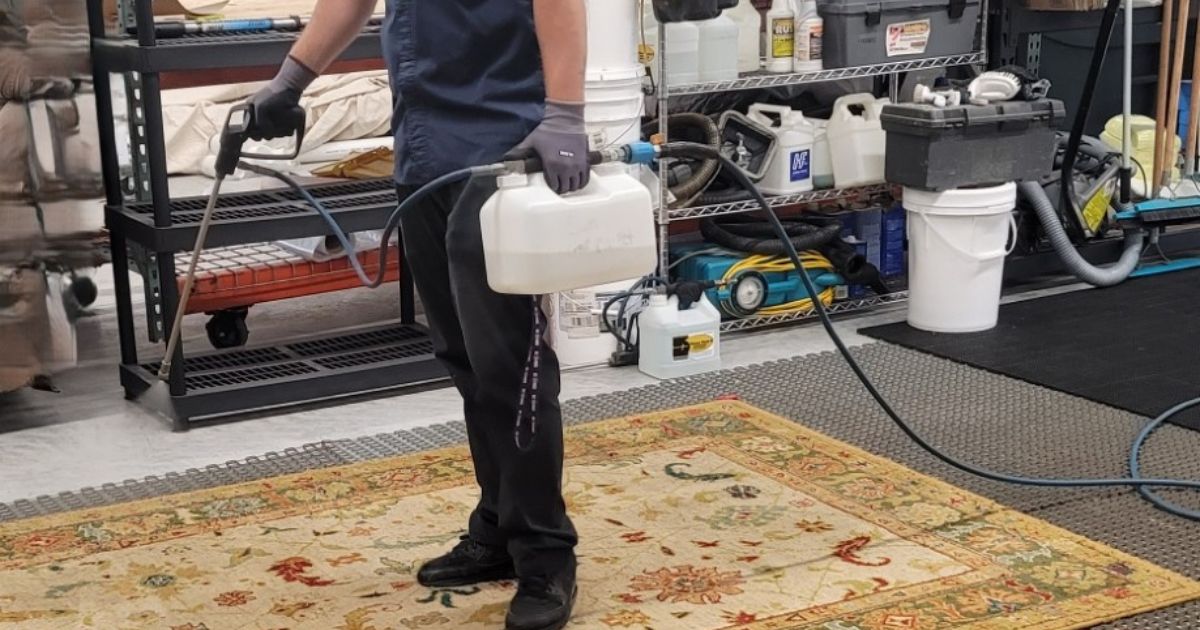Area rugs do a lot more than dress up a room. They quietly collect almost everything floating in your home’s air. Turns out, they can hold up to several pounds of trapped dirt and allergens per year, even in tidy homes. That hidden layer is doing more harm than you think because what sits beneath your feet can impact both your family’s health and your wallet in ways most people never realize. Read on to understand more about area rug cleaning importance.
Table of Contents: Area Rug Cleaning Importance
Quick Summary
| Takeaway | Explanation |
|---|---|
| Professional cleaning preserves rug life. | Regular professional cleaning extends the life and maintain the integrity of area rugs, protecting them from damage and degradation. |
| Understand fabric types for cleaning. | Different fabrics require specific cleaning methods to avoid damage. Knowing the material helps in selecting the right approach. |
| Prevent health risks with regular cleaning. | Accumulated dirt and allergens in rugs can cause respiratory issues and other health problems, making regular cleaning vital for health. |
| Investment in cleaning protects value. | Quality area rugs represent significant financial investments. Regular maintenance helps retain their aesthetic and financial value. |
| Use specialized techniques for best results. | Professional cleaning involves advanced methodologies tailored to individual fabric types, ensuring effective and safe cleaning without harm. |
What is Area Rug Cleaning and Its Significance?
Area rug cleaning represents a specialized maintenance process designed to preserve the appearance, functionality, and longevity of decorative floor coverings. Unlike standard carpet cleaning, area rug cleaning requires nuanced techniques that consider unique fabric compositions, weaving patterns, and potential delicacy of materials.
Understanding Area Rug Composition and Cleaning Needs
Area rugs come in diverse materials ranging from natural fibers like wool and silk to synthetic alternatives such as nylon and polyester. Each material demands specific cleaning approaches to prevent damage and maintain structural integrity. According to New Mexico State University, proper care of fabric home furnishings involves understanding their specific characteristics and implementing targeted maintenance strategies.
Key considerations for area rug cleaning include:
- Fabric type and origin
- Weaving technique
- Age and historical value
- Potential color sensitivity
- Environmental exposure
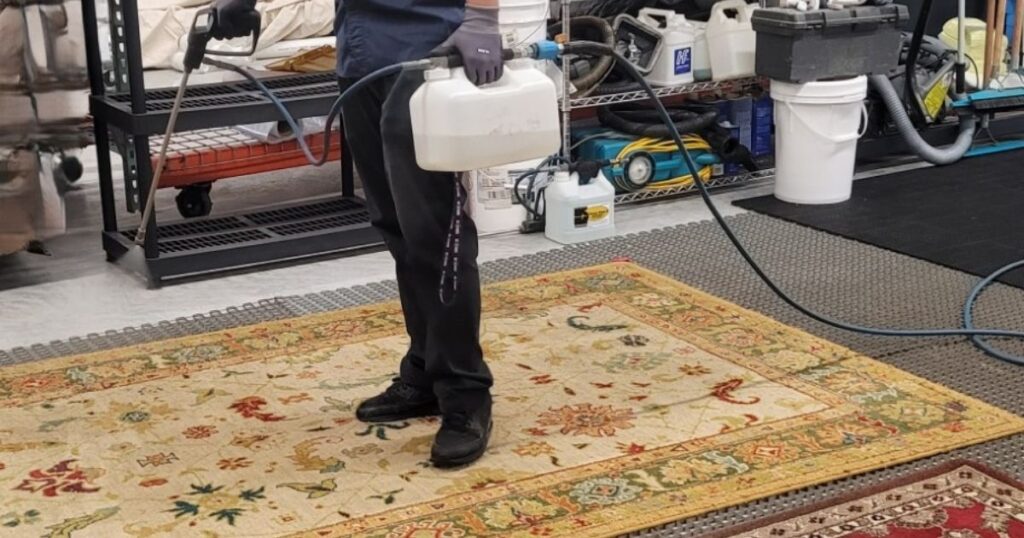
Significance of Professional Area Rug Cleaning
Professional area rug cleaning transcends basic surface cleaning. It involves comprehensive processes that address both visible dirt and hidden contaminants. Deep cleaning techniques remove embedded particles, allergens, and microbial growth that standard vacuuming cannot eliminate.
The cleaning process typically involves multiple strategic steps:
- Detailed fabric analysis
- Specialized pre-treatment
- Gentle yet thorough cleansing
- Controlled drying
- Restoration of fabric texture
Regular professional cleaning prevents permanent staining, fabric degradation, and potential health risks associated with accumulated dust, bacteria, and potential allergen buildup. By investing in professional area rug cleaning, homeowners protect their valuable floor coverings and maintain a healthier indoor environment.
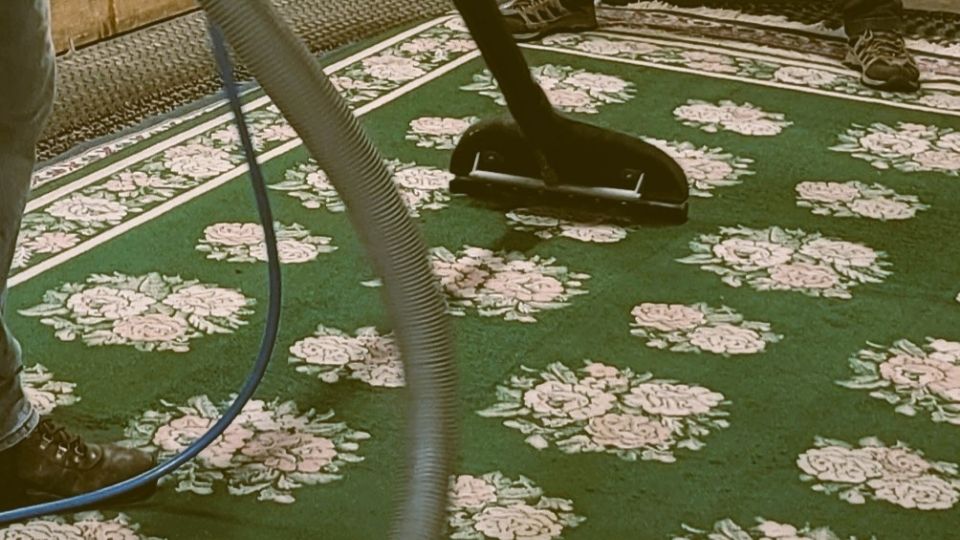
Why Regular Cleaning Matters for Health and Longevity
Regular area rug cleaning extends far beyond aesthetic maintenance, serving as a critical practice for protecting both personal health and the substantial financial investment represented by quality floor coverings. Indoor textiles function as complex filtration systems, accumulating microscopic particles, allergens, and potential contaminants that require systematic removal. Area rug cleaning importance is higher than ever to ensure a healthy home.
Health Implications of Clean Area Rugs
The connection between area rug cleanliness and human health is profound and multifaceted.
According to research from the National Institutes of Health, indoor surfaces like area rugs can harbor significant microbial populations and particulate matter that directly impact respiratory wellness and overall environmental hygiene.
Potential health risks associated with poorly maintained area rugs include:

- Increased allergen concentration
- Respiratory irritation triggers
- Potential mold and mildew development
- Dust mite proliferation
- Enhanced bacterial growth
Preserving Textile Integrity and Financial Value: Area Rug Cleaning Importance
Area rugs represent substantial financial investments that demand strategic maintenance to preserve their structural integrity and aesthetic appeal. Regular professional cleaning prevents progressive fabric degradation, color fading, and structural weakening caused by accumulated dirt and environmental stressors.
Key longevity factors addressed through consistent cleaning include:
- Preventing permanent fiber damage
- Maintaining original color vibrancy
- Protecting intricate weaving patterns
- Reducing long-term replacement costs
- Extending overall textile lifespan
By implementing systematic cleaning protocols, homeowners not only safeguard their health but also protect the monetary and emotional value embedded in their cherished area rugs.
The following table outlines the major health and structural risks from neglecting regular area rug cleaning, as detailed in the article.
| Risk Category | Specific Concerns | Potential Impact |
|---|---|---|
| Health Risks | Increased allergens, respiratory irritants, bacteria | Allergies, asthma, potential infections |
| Mold & Mildew | Moisture plus dirt enables mold growth | Poor air quality, health hazards, odor |
| Allergen Buildup | Dust mites, pet dander, pollen retention | Triggers for allergies and asthma |
| Structural Damage | Fiber wear, color fading, fabric weakening | Shortens rug lifespan, reduces investment value |
| Financial Risks | Accelerated degradation, aesthetic loss | Expensive replacements, decreased resale/appeal |
How Dirt and Allergens Affect Area Rugs
Area rugs act as complex environmental filters, capturing and retaining microscopic particles that can significantly impact indoor air quality and personal health. Understanding the intricate relationship between dirt, allergens, and textile surfaces reveals the critical importance of systematic cleaning and maintenance.
Microscopic Contamination Mechanisms
Dirt and allergens do not merely rest on area rug surfaces but become deeply embedded within intricate fiber structures. According to the American Lung Association, carpets and rugs function as sophisticated traps for pollutants, collecting substances that can potentially compromise respiratory wellness and overall environmental hygiene.
Primary contaminants that infiltrate area rugs include:
- Dust mite particles
- Pet dander
- Pollen fragments
- Microscopic soil elements
- Atmospheric pollutants
Structural and Health Implications
Accumulated contaminants create multiple potential risks for both textile integrity and human health. As particles become trapped within rug fibers, they generate an environment conducive to bacterial growth, potential mold development, and progressive fabric degradation.
Significant consequences of unaddressed contamination encompass:
- Accelerated fabric deterioration
- Increased respiratory irritation potential
- Compromised indoor air quality
- Enhanced allergen concentration
- Potential long-term health complications
The microscopic interactions between dirt, allergens, and textile surfaces demonstrate why professional cleaning represents more than aesthetic maintenance. It is a critical intervention that protects both personal wellness and valuable textile investments, transforming area rugs from passive floor coverings into active components of a healthy indoor ecosystem.
The Role of Professional Cleaning in Rug Preservation: Area Rug Cleaning Importance
Professional rug cleaning transcends standard maintenance, representing a sophisticated preservation strategy that combines scientific knowledge, specialized techniques, and technical expertise. These services protect area rugs as complex textile artifacts with unique material compositions and inherent historical or sentimental value.
Advanced Cleaning Methodologies
Professional cleaning approaches differ dramatically from amateur efforts, utilizing precise techniques tailored to specific fabric characteristics. According to The George Washington University Museum, specialized cleaning processes require deep understanding of textile structures and potential degradation mechanisms.
Key professional cleaning differentiators include:
- Fabric-specific chemical treatments
- Precision moisture control
- Specialized cleaning equipment
- Expert stain removal techniques
- Comprehensive fiber analysis
Preservation and Restoration Strategies
Professional cleaners function as textile conservationists, implementing strategies that extend beyond surface cleaning. Their interventions address microscopic damage, prevent progressive deterioration, and restore rugs to optimal condition.
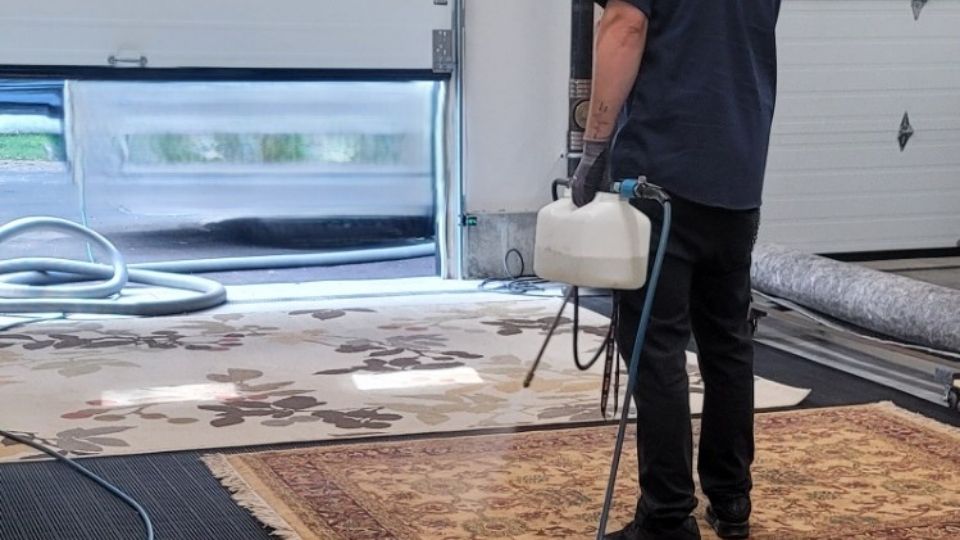
This approach transforms cleaning from a routine maintenance task into a proactive preservation method.
Critical preservation considerations encompass:
- Preventing permanent fiber damage
- Neutralizing potential chemical degradation
- Restoring original color vibrancy
- Eliminating embedded contaminants
- Reinforcing textile structural integrity
By employing scientifically informed cleaning protocols, professionals protect area rugs as valuable cultural and personal artifacts, ensuring their longevity and maintaining their aesthetic and functional qualities for generations.
Understanding Common Methods of Area Rug Cleaning
Area rug cleaning represents a sophisticated process that requires specialized knowledge and tailored approaches based on fabric composition, weaving techniques, and specific contamination challenges. Professional cleaners utilize multiple methodological strategies to address diverse textile maintenance requirements.
Dry Cleaning and Vacuum-Based Techniques
Preliminary cleaning often involves mechanical particle removal strategies. According to the New York State Office of General Services, proper vacuum maintenance and systematic removal of surface debris form the foundational first step in comprehensive rug preservation.
Key dry cleaning approaches include:
- HEPA filtered vacuuming
- Dry compound treatments
- Compressed air particle removal
- Specialized brush techniques
- Precision particulate extraction
Chemical and Moisture-Based Cleaning Methods
Professional cleaning transcends surface-level maintenance, incorporating advanced chemical treatments designed to address embedded contaminants without compromising textile structural integrity. These methods involve precise chemical selections matched to specific fabric compositions and contamination types.
Comprehensive cleaning methodologies encompass:
- Steam cleaning technologies
- Biodegradable solvent applications
- Enzymatic stain removal processes
- Targeted chemical treatments
- Controlled moisture extraction techniques
By integrating scientific understanding with technical expertise, professional rug cleaning transforms routine maintenance into a sophisticated preservation strategy that protects both the aesthetic and functional qualities of valuable textile investments.
Below is a comparison of common professional area rug cleaning methods, summarizing their primary techniques and key benefits.
| Cleaning Method | Primary Technique | Key Benefits |
|---|---|---|
| HEPA Vacuuming | High-efficiency particulate vacuuming | Removes surface & embedded particulates |
| Dry Compound Cleaning | Absorbent cleaning powders and agitation | Minimal moisture, quick drying |
| Compressed Air Extraction | Air-blasting to dislodge particles | Effective for delicate or antique rugs |
| Steam Cleaning | Hot water extraction with controlled heat | Deep contaminant removal, sanitization |
| Biodegradable Solvent Treatment | Eco-friendly chemical application | Targets spots, stains, safe for most fabrics |
| Enzymatic Stain Removal | Enzyme-based cleaning solutions | Breaks down organic contaminants, eco-friendly |
| Controlled Moisture Extraction | Removal of moisture with specialized tools | Prevents overwetting, protects fibers |
Protect Your Family and Investment with Expert Area Rug Cleaning
Are you concerned that hidden dirt and allergens are putting your loved ones and cherished area rugs at risk? The article clearly explains how rugs can quickly collect dust, bacteria, and microscopic soil that regular cleaning just cannot remove. Over time, this not only harms your family’s respiratory health but also causes permanent rug fiber damage and fading, reducing the value of your investments.
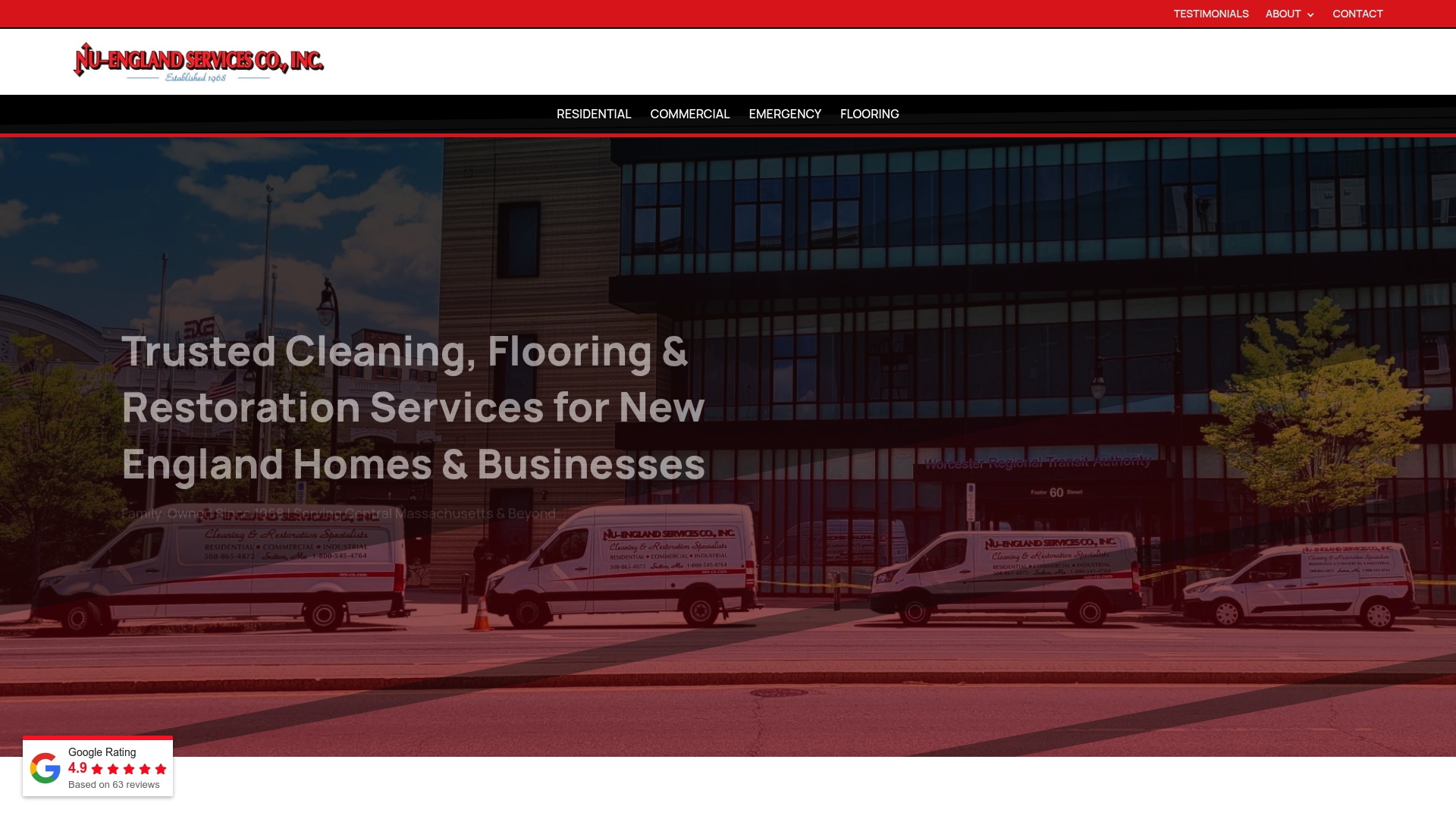
Take action today to shield your home from these avoidable threats. Choose Nu-England Services for a family-owned cleaning team with a proven track record since 1968. Our professionals use deep cleaning methods described in the article to rid your rugs of allergens and embedded particles. Find out how we can restore your area rugs, improve your indoor air quality, and extend your rug’s lifespan. Ready to breathe easier and revive the beauty of your home? Request a free quote now and start enjoying a cleaner, healthier environment for your family now that you know more about area rug cleaning importance.
Frequently Asked Questions about Area Rug Cleaning Importance
What is area rug cleaning and why is it important?
Area rug cleaning is a specialized maintenance process that preserves the appearance, functionality, and longevity of rugs. It is important because it prevents dirt buildup, allergens, and other contaminants that can harm both the rug and indoor air quality.
How often should area rugs be professionally cleaned?
It is recommended to have area rugs professionally cleaned every 1 to 3 years, depending on factors like foot traffic, usage, and the rug’s material composition. Regular cleaning maintains the rug’s condition and extends its lifespan.
What methods are used in professional area rug cleaning?
Professional area rug cleaning utilizes various methods, including dry cleaning and moisture-based techniques. These methods involve HEPA-filtered vacuuming, steam cleaning, and targeted chemical treatments tailored to specific fabric types.
How do dirt and allergens affect area rugs and indoor air quality?
Dirt and allergens can accumulate in area rugs, leading to poor indoor air quality and health issues such as respiratory irritation. Regular cleaning is essential to remove these contaminants and maintain a healthy living environment.

